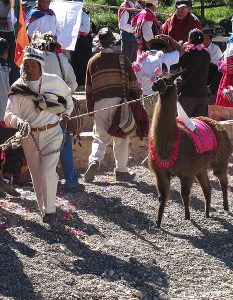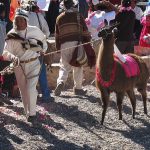COCHABAMBA, Bolivia (Morning Star News) – Protestant church leaders in Bolivia are trying to revoke a new law they say aims to “impose contrary beliefs” and “denies us the right to be a church.”
Asserting that Law 351 is unconstitutional, the National Association of Evangelicals of Bolivia (ANDEB) will file suit this week before the Plurinational Legislative Assembly demanding that it be revoked; Christian leaders argue its re-registration requirements restrict the “rights and religious freedoms of churches.”
The law stipulates a standardized administrative structure for all “religious organizations” that church groups must adopt.
“This would force churches to betray their true ecclesiastical traditions,” Ruth Montaño, legal advisor and former board member of ANDEB told Morning Star News. “The measure deprives them of any autonomy to follow their original faith convictions.”
Churches failing to complete the re-registration within a two-year period would lose their legal right to exist. The ANDEB suit charges that Law 351 aims to “control” churches and “impose contrary beliefs” upon the Christian faith and “denies us the right to be a church.”
ANDEB organized protest marches by an estimated 20,000 people on Aug. 17 in five cities throughout the country to state their opposition to the policies of President Evo Morales’s administration.
At the heart of the demonstrations was opposition to Law 351 for Granting of Juridical Personality to Churches and Religious Groups, passed in March. The statute requires all churches and not-for-profit organizations to re-register their legal charters with the government. This involves supplying detailed data on membership, financial activity and organizational leadership.
“They want to control the activities of the evangelical churches,” Agustín Aguilera, president of ANDEB, told the Santa Cruz newspaper El Deber. “Article 15 (of the law) would force all religious organizations to carry out our activities within the parameters of the ‘horizon of good living,’ which is based on the [ethnic] Aymara worldview. This is an imposition of a cultural and spiritual worldview totally foreign to ours.”
President Morales identifies himself ethnically as Aymara, although he also claims to be a “grassroots Catholic.” Aymara-speakers form the second largest indigenous group in Bolivia, after Quechuas.
Government officials are not granting legal status to newly formed evangelical churches, pending approval of regulations being formulated by the Registry Office of Worship, according to ANDEB leaders. The proposed statutes violate the constitution in terms similar to those of Law 351, they say.
Protestant leaders assert that, taken together, the new measures grant the government regulatory power over the internal affairs of churches to the point of defining what is and is not a church.
Ironically, Morales assumed office in 2006 with promises of greater religious freedom. The first indigenous Andean to be democratically elected president of Bolivia, he abolished the historic domination of the Roman Catholic Church over religious affairs.
The constitution of February 2009 established a “secular state” designed to be neutral in matters of faith and conscience. The country’s Protestant Christian population, which had long sought church and state separation, initially welcomed the new political order. They assumed a secular state meant the end of religious discrimination.
Protestant leaders now fear, however, that pre-Colombian animism is replacing Roman Catholicism as the official state religion. Morales’s administration routinely invites amautas (folk doctors) to bless government ceremonies, instead of Roman Catholic priests as per traditional protocol.
At Morales’s invitation, ANDEB leaders have been working since 2010 to formulate a law to guarantee freedom of religion. They believe the legislation is needed to ensure that constitutional guarantees be respected.
Their effort so far has gone unrewarded. Despite his repeated public statements that freedom of worship is a priority, Morales has yet to follow through on his promise to introduce the religious liberty legislation to parliament.
Nor has he responded to a letter ANDEB officials presented him last year asking for an audience to discuss the religious liberty bill. Instead, Morales signed the restrictive Law 351 over evangelical objections.
“Along with the suit to revoke Law 351, ANDEB attorneys plan to introduce the Law for Religious Liberty to the Plurinational Legislative Assembly,” Montaño said. “And we expect a positive response from congressional members.”
At the same time, ANDEB is initiating a national petition campaign and consultations with parliamentary representatives in every department (state) of the country, she said.
“Should all else fail, we plan to file an ‘abstract of unconstitutionality’ against Law 351 before the Constitutional Tribune in order to protect our rights,” Montaño said.
As in most South American countries, Protestant worship was banned in Bolivia until about 100 years ago. Today evangelical Christians represent 16 percent of the country’s population of 10 million, according to Operation World.
###
© 2013 Morning Star News. Articles may be reprinted with credit to Morning Star News.
Morning Star News is a 501(c)(3) non-profit corporation whose mission is to inform those in the free world and in countries violating religious freedom about Christians worldwide who are persecuted for their faith. For free subscription or to make tax-deductible donations, contact [email protected], or send check to Morning Star News, 24310 Moulton Parkway, Suite O # 157, Laguna Hills, CA 92637, USA.
- Aymara ceremony in Copacabana, Bolivia. (Wikipedia)



Encapsulating the Aymara worldview as animism is simplistic and misleading. On this Columbus Day we would do well to consider our treatment of “First Peoples” and the racism implicit in the Northern view of “development”. Respect, indeed love, of everything is a notion Jesus would have found agreeable.
This does not surprise. Evo Morales is an adept to Fidel Castro style marxist-lennism which by doctrine restricts religious freedoms and freedom of speech. Evo Morales and his party are part of the marxist socialist association in South America called the Forum of Sao Paulo or Foro de São Paulo. The Forum of Sao Paulo was spearheaded by Fidel Castro and Luis Lula da Silva (Brasil) in the late 80s and early nineties and is still alive and flush with cash. (https://en.wikipedia.org/wiki/Foro_de_S%C3%A3o_Paulo) It is an organization which has been pooling resources such as cash, media, and academic marxist professors to implement communism-socialism. Evo Morales is following the model in Venezuela. Brasil almost fell completely into the hands of these socialists but due to its educated middle class and conservative people the communist Dilma Rouseff was impeached. The Workers Party has lost it political relevance also due to the worst corruption in the history of south america..